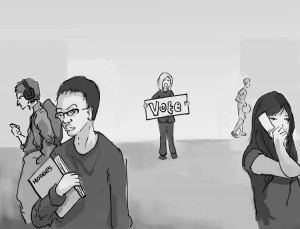USG is more effective than students think
If you cast a ballot for the Undergraduate Student Government elections in the last few years, you were in the minority.
In 2010’s election for example, of the approximately 16,000 eligible undergraduate student voters, only about 4,550 turned up to the polls on campus or online.
Overall, that’s less than one-third of the undergraduate student population.
Thirty three percent is actually quite high considering USC students’ general inability to muster up the energy to vote on anything.
Only 500 ballots were cast at USC’s sole on-campus polling station — Marks Tower — for the 2010 midterm elections.
When I visited the same location last summer for the primaries, a beleaguered high school volunteer named Jessica informed me with the weary aplomb of someone who had been there since five that morning that only half a dozen voters had filtered through during the day, and not all students.
But the issue at hand is not political turnout.
In the next few days, USC students have a chance to concretely affect the way their collegiate experience unfolds — not through state or national politics, but through the local student government.
USG has taken upon itself the commendable, if Sisyphean, battle of raising voter turnout this year to 6,000 voters.
Let’s hope the student body can be roused from its apathy.
Part of the problem might be a general misconception about what USG actually does.
Many of us climbed the academic ranks through the kind of elementary and high schools where adding vending machines were student government pipe dreams, and candidates announced their goals with acrostics.
To contrast: This year’s presidential cabinet and senate successfully lobbied for an extra day of Thanksgiving break.
They worked to improve the notoriously spotty USC wireless coverage.
They organized school sponsored excursions to Los Angeles hot spots, such as the beach and Universal City Walk.
Past USG initiatives have introduced the free trams to L.A. Live, extended Lyon Center hours to midnight, and even helped to decide the food choices in the Tutor Campus Center.
Lest you worry that I’m hidden somewhere in the organization’s payroll, I’ll be the first to admit that USG has its flaws.
There have been good presidents, there have been mediocre presidents, there have been presidents who have prompted incendiary editorials from this newspaper that included metaphors about dogs peeing on the carpet.
But that’s all up to the voters. The ones who show up will determine if next year will see a presidential ticket that has its thumb on the pulse of the student body.
Some have raised questions about a decidedly high Greek presence in USG.
Greek students accounted for 43 percent of the vote in last year’s election — an amazing feat considering the Greek system makes up only about a fifth of the student body.
For better or for worse, those students over on 28th Street know better than anyone how to mobilize — if only the rest of the student population could follow suit.
So in the coming weeks, it’s time for students to take a few minutes out of their day to familiarize themselves with the presidential and senatorial candidates.
The Daily Trojan will be running profiles this week, and the USG website also provides information.
Industrious students can attend can even stop to talk to the hoard of canvassers on Trousdale.
And finally, well informed students should vote online or in person. It’s easier to be cynical, but more important to play an active role in your next year of college.
For more coverage on the 2011 USG elections, click here.
Lucy Mueller is a senior majoring in cinema-television production. Her column, “Everything is Copy,” runs every other Thursday.

